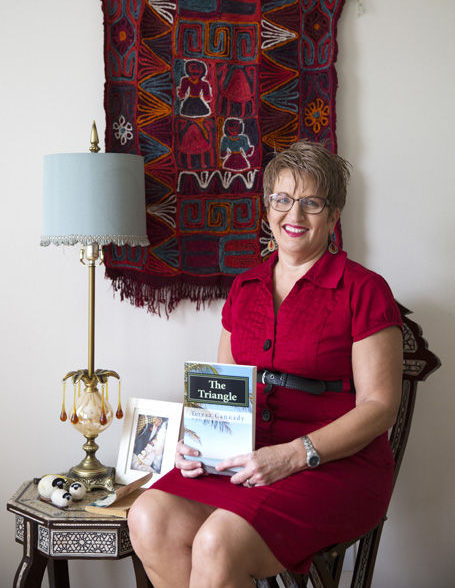
Five years ago, Teresa Cannady finally realized she was never going to finish the book she was writing if she kept bouncing around the world.
From Kazakhstan to Cairo, Albania to Sri Lanka, the one-time small-town attorney from Alabama had worked for 18 years in what she and her cohorts call the “legal Peace Corps,” advocating for human rights and attempting to modernize justice systems, particular with regard to women.
Often in places where she had no cable TV and no knowledge of the language, she pursued a lifelong passion: She wrote. Poems, essays, the occasional article, and the start of a novel.
It was during a year-long break from living abroad, just over a year in Washington, D.C., that she was hanging out with friends from her most recent posting – running a family law project in Egypt – when somebody suggested visiting a coworker living in Naples, Florida. Envious of her friend’s life by the beach, Cannady began to think it would be the ideal setting to wrangle the rest of her book into publishable form.
Already she had more material than she needed, with each stop in her career seeming to inspire another chapter. “The Triangle,” published last fall, is a thriller involving the U.S. and China both wanting to develop chemical weapons, with Taiwan playing both sides against the middle. Unraveling the secret schemes were two young American biologists trying to find the reason for mutant marine life showing up on a remote Pacific island.
“I started writing the book a long, long time ago,” Cannady says. “I had a very broad outline about what I wanted to have happen, but ideas would just pop up like popcorn.” Finding time to put the pop-ups to paper was proving more and more difficult.
So on that visit to Florida, Cannady crossed the state to Vero Beach, checking into Costa d’Este on a Friday. The next day, she went house-hunting. And by Saturday evening, “I was signing the contract by the pool,” she recalls.
“My friends were shocked that I moved so quickly,” she says from the living room of her home in a development southwest of Vero. “I’ve been very happy.”
She also finished her book. Not that she wasn’t distracted again. She spent six months in Sri Lanka in 2013, helping the government there improve its judicial system, then headed off for most of the next two years in Ramallah in the West Bank. There, she led a project through USAID to improve the Palestinian justice system’s family courts.
For the daughter of parents who still don’t have passports, the former accounting major in college laid the groundwork for her international career at the University of Alabama law school – though she never expected to do more than hang a shingle in her own hometown.
For seven years, she practiced civil and criminal law in Albertville, Alabama, not far from Huntsville. There her father made his living driving an 18-wheeler taking Cargill feed to chicken farms – he used to bring his daughter his log books to practice writing in. Neither he nor her mother went to college. Teresa, who was always a good student, and published a few poems and stories in high school, found herself first at community college, then a small private college, and finally the University of Alabama.
With her newly minted law degree in 1991, she went into private practice. “It wasn’t a goal; it just happened. And pretty soon, you figure out that it was the same case, different face, and you start to think, is this all there is?”
Then a brochure about an exchange program crossed her desk. The Alabama state bar had set up a program with the bar in St. Petersburg, Russia, as a continuing education program. It was 1995. Cannady, 32, paid her tuition and went.
Landing in Russia, she was whisked off from the airport to a microdistrict of sprawling apartment buildings, and found herself in the cramped home of a woman judge who spoke almost no English.
For 12 days, the judge led Cannady on a tour of the Russian court system. Brief as it was, that experience hooked her on international consulting. “That’s what got me interested.”
In subsequent years her work and travels took her to – among other locations – Kazakhstan, Turkmenistan, Uzbekistan, Kyrgyzstan, Macedonia, Bosnia, Albania, the Philippines and Egypt.
While she left enough cliff-hangers to write a sequel to “The Triangle,” she is also working on another nonfiction book, a memoir of her travels. The working title: “That Monkey Stole My Pizza.” That, of course, actually happened – at a poolside restaurant in Botswana.



